外研(新标准)版七年级下 Module 8 Unit 3 Language in use. 课件 (共38张PPT)
文档属性
| 名称 | 外研(新标准)版七年级下 Module 8 Unit 3 Language in use. 课件 (共38张PPT) |
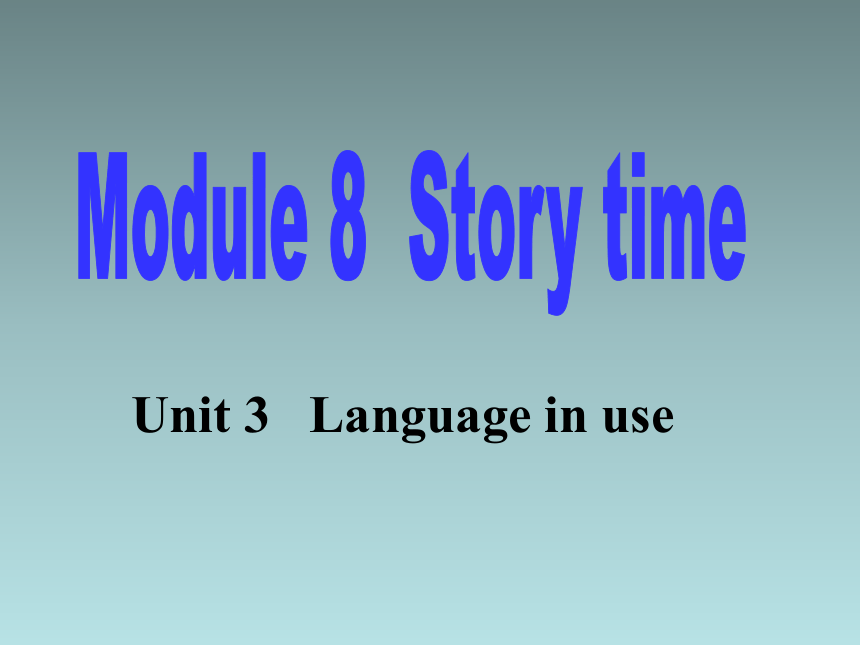
|
|
| 格式 | ppt | ||
| 文件大小 | 6.5MB | ||
| 资源类型 | 教案 | ||
| 版本资源 | 外研版 | ||
| 科目 | 英语 | ||
| 更新时间 | 2022-07-09 00:00:00 | ||
图片预览

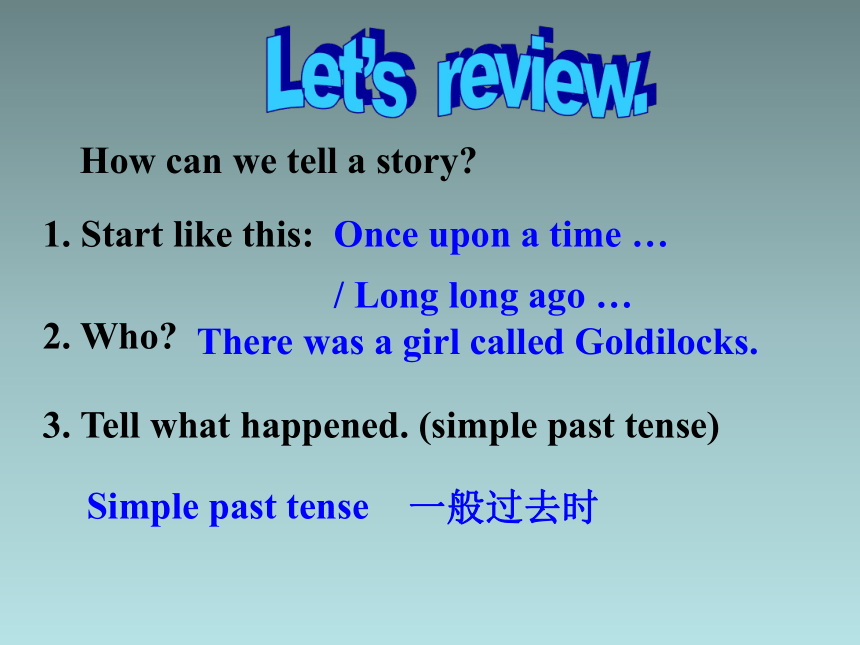
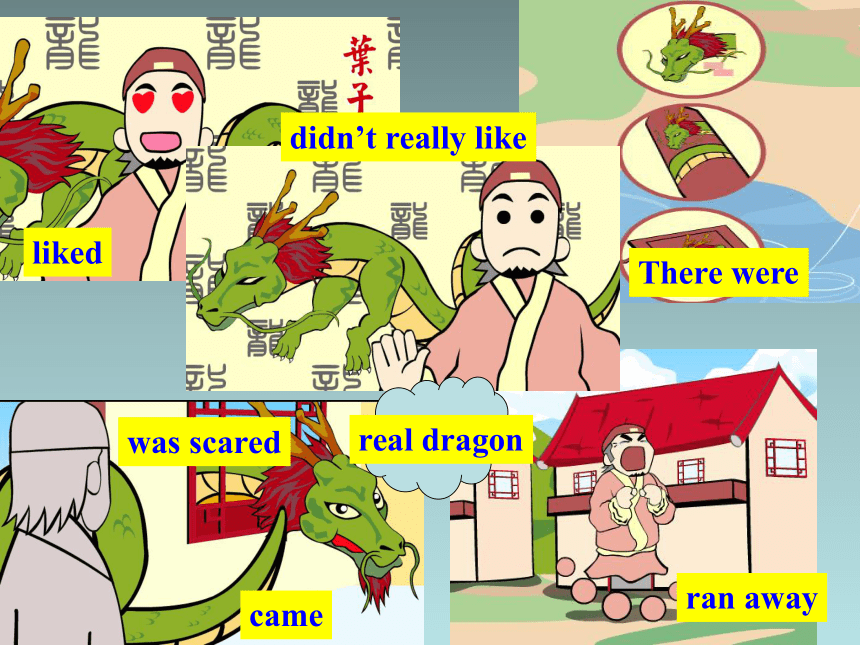
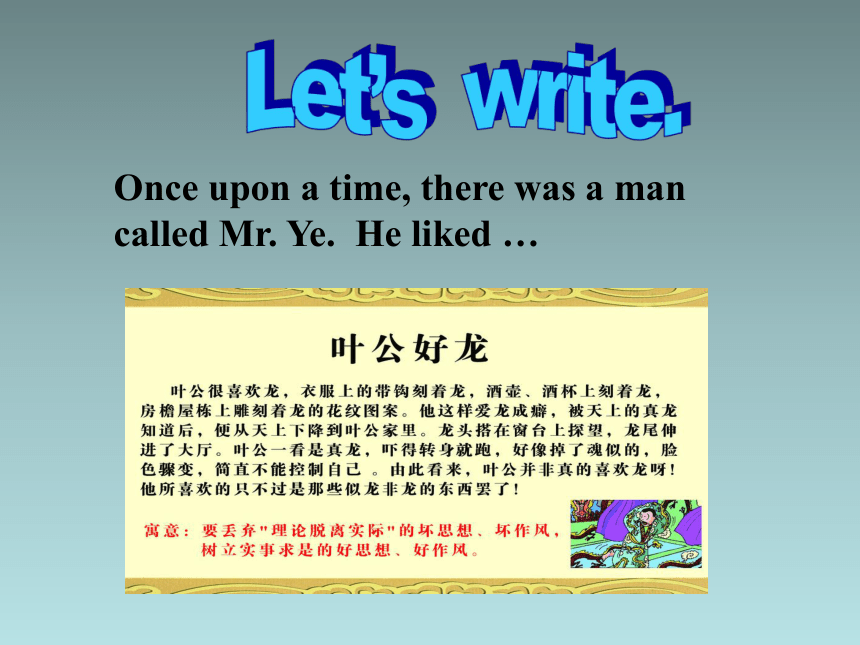
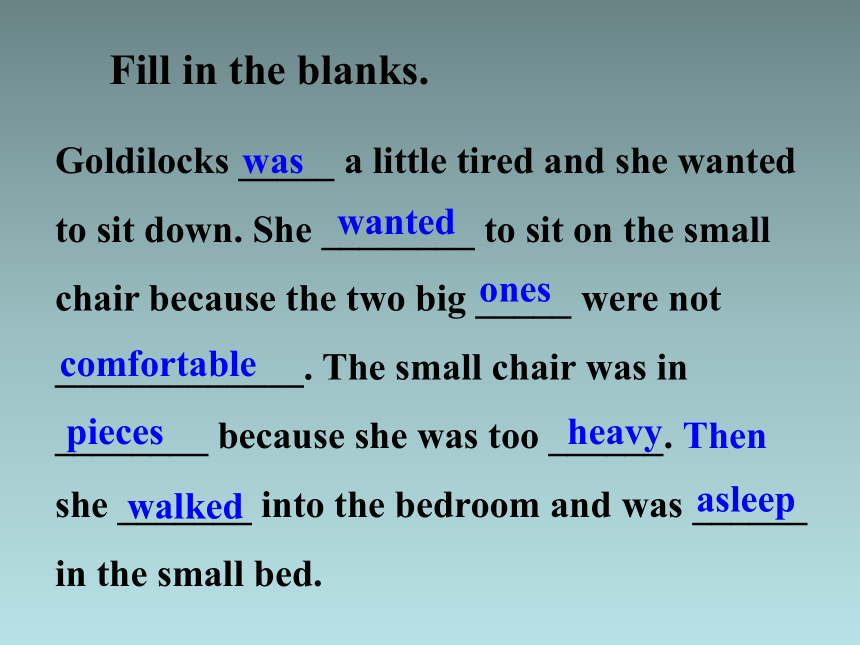
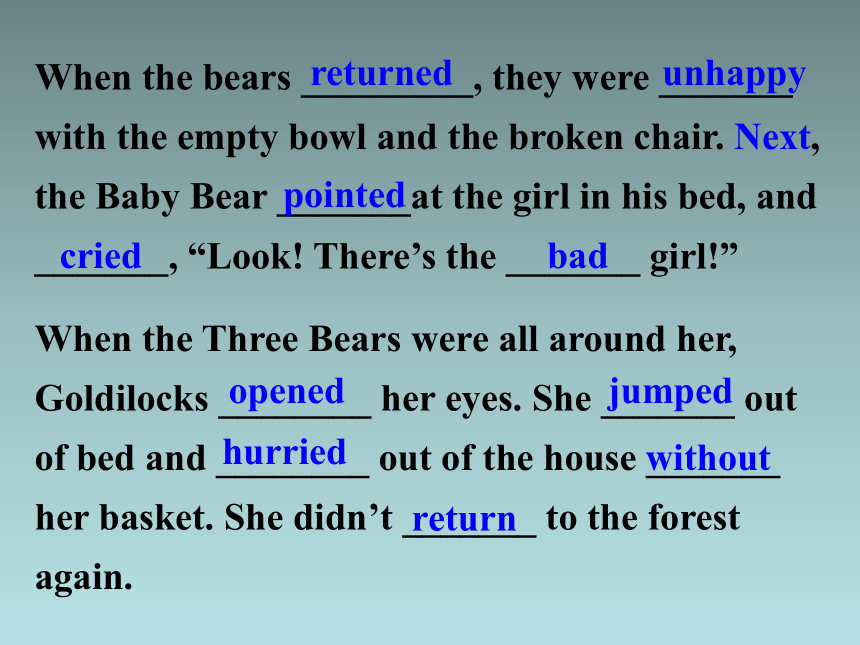
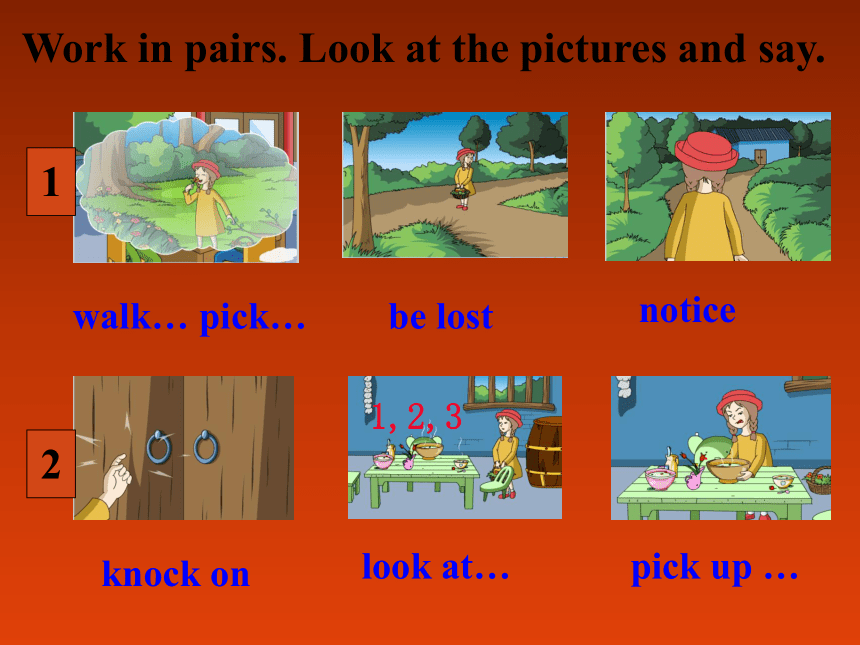
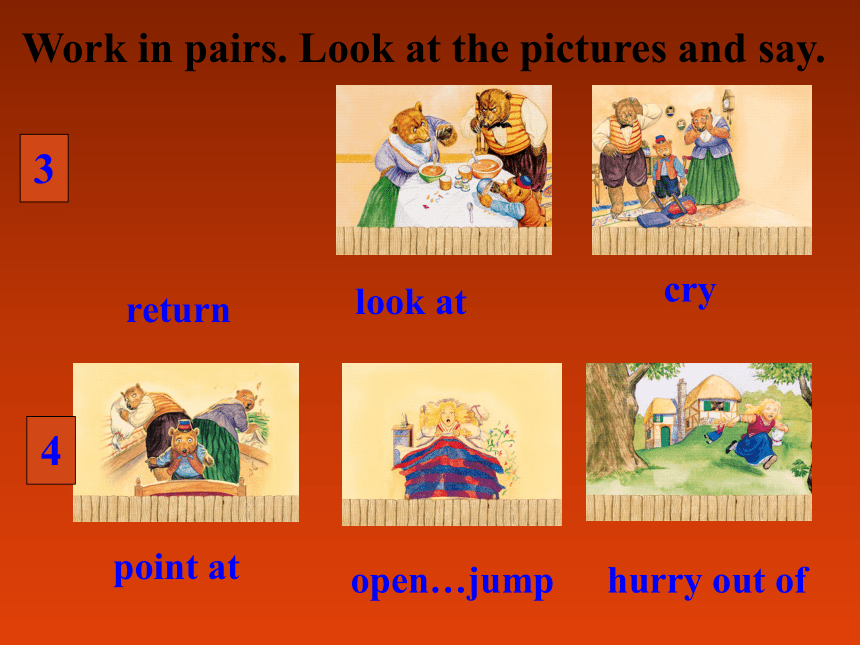
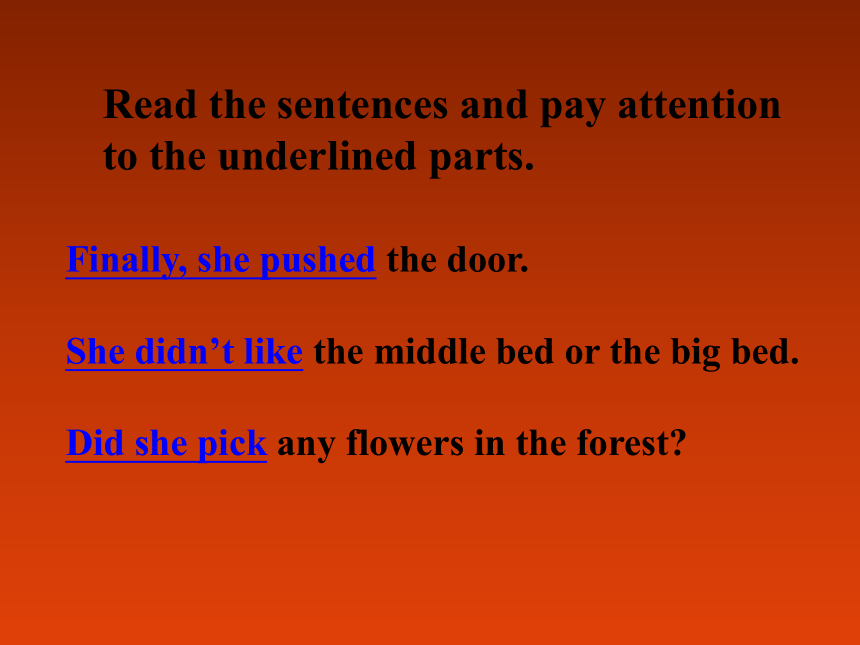
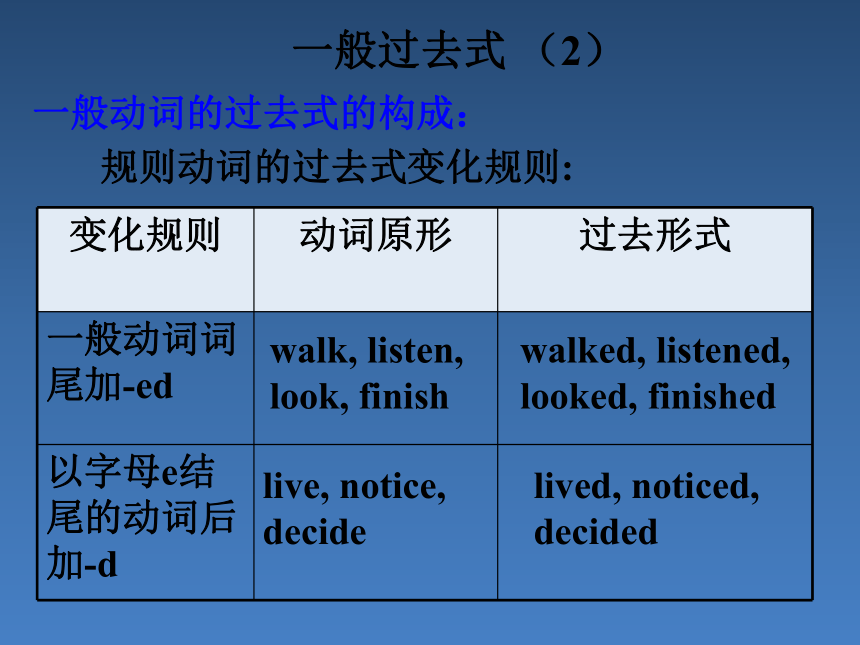
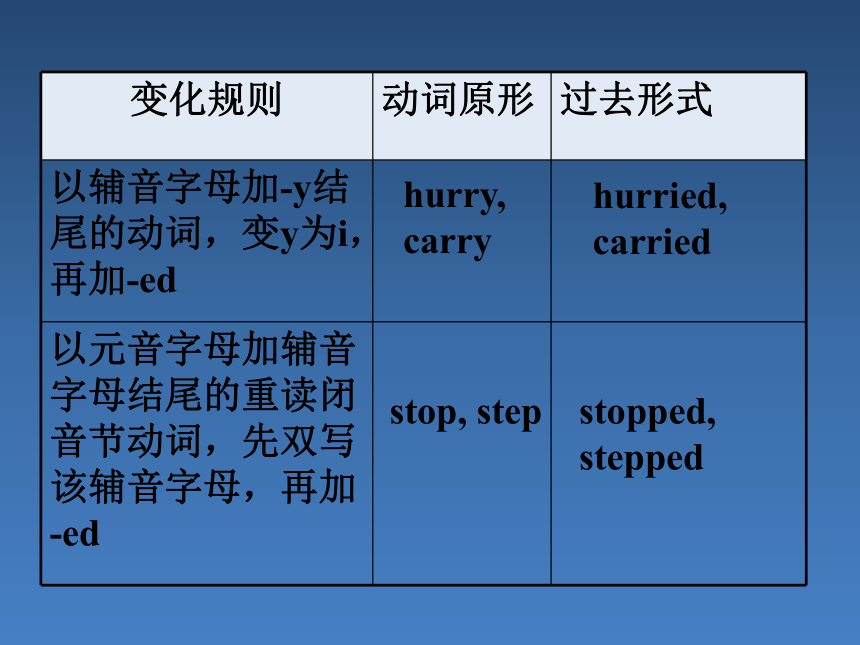
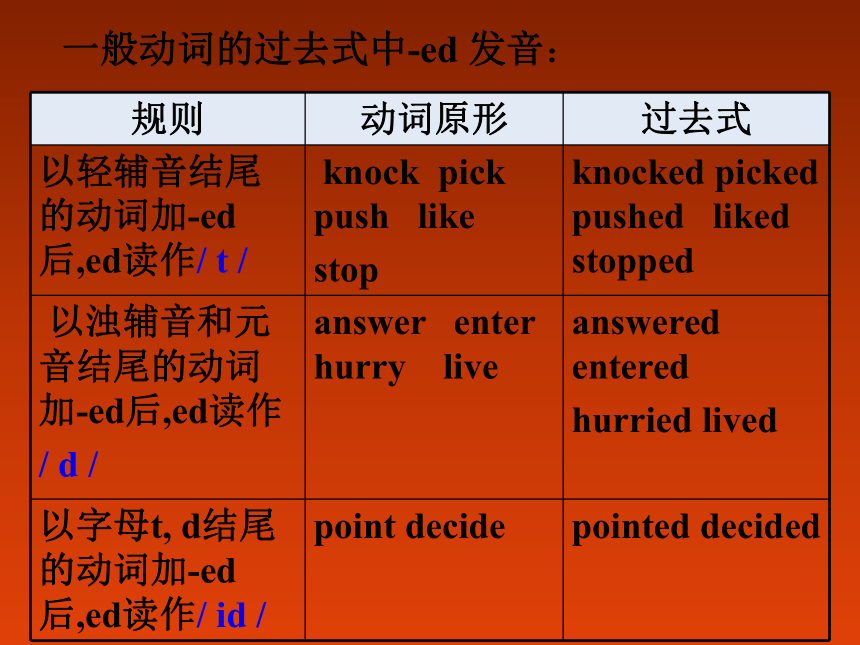
文档简介
(共38张PPT)
Unit 3 Language in use
How can we tell a story
1. Start like this:
2. Who
3. Tell what happened. (simple past tense)
Once upon a time …
/ Long long ago …
一般过去时
Simple past tense
There was a girl called Goldilocks.
liked
There were
came
ran away
didn’t really like
real dragon
was scared
Once upon a time, there was a man called Mr. Ye. He liked …
Fill in the blanks.
Goldilocks _____ a little tired and she wanted to sit down. She ________ to sit on the small chair because the two big _____ were not _____________. The small chair was in ________ because she was too ______. Then she _______ into the bedroom and was ______ in the small bed.
was
wanted
ones
comfortable
pieces
heavy
walked
asleep
When the bears _________, they were _______ with the empty bowl and the broken chair. Next, the Baby Bear _______at the girl in his bed, and _______, “Look! There’s the _______ girl!”
When the Three Bears were all around her, Goldilocks ________ her eyes. She _______ out of bed and ________ out of the house _______ her basket. She didn’t _______ to the forest again.
returned
unhappy
pointed
cried
bad
opened
jumped
hurried
without
return
Work in pairs. Look at the pictures and say.
walk… pick…
be lost
notice
knock on
1
2
1,2,3
look at…
pick up …
3
return
look at
cry
open…jump
point at
hurry out of
4
Work in pairs. Look at the pictures and say.
Read the sentences and pay attention to the underlined parts.
Finally, she pushed the door.
She didn’t like the middle bed or the big bed.
Did she pick any flowers in the forest
一般过去式 (2)
一般动词的过去式的构成:
变化规则 动词原形 过去形式
一般动词词尾加-ed
以字母e结尾的动词后加-d
walk, listen, look, finish
walked, listened, looked, finished
live, notice, decide
lived, noticed, decided
规则动词的过去式变化规则:
变化规则 动词原形 过去形式
以辅音字母加-y结尾的动词,变y为i,再加-ed
以元音字母加辅音字母结尾的重读闭音节动词,先双写该辅音字母,再加-ed
hurry,
carry
hurried,
carried
stop, step
stopped,
stepped
一般动词的过去式中-ed 发音:
规则 动词原形 过去式
以轻辅音结尾的动词加-ed 后,ed读作/ t / knock pick push like
stop knocked picked pushed liked stopped
以浊辅音和元音结尾的动词加-ed后,ed读作
/ d / answer enter hurry live answered entered
hurried lived
以字母t, d结尾的动词加-ed后,ed读作/ id / point decide pointed decided
表示过去没有做某事,要用行为动词一般过去式的否定形式。由助动词do的一般过去式did +not (didn’t)+行为动词构成。如:
Baby Bear didn’t look into the bedroom.
熊宝宝没有往卧室里看。
I didn’t finish my homework yesterday.
昨天我没有完成家庭作业。
He didn’t play football yesterday.
昨天他没有踢足球。
注意:一般过去式的否定助动词didn’t没有人称和数的变化,后面的谓语动词也变成原形。
如果要询问别人在过去的某一时间里是否做了什么事,这时我们需要用一般过去时的疑问形式。如:
Did you listen to the news in the morning
早上你听新闻了吗?
Did you watch TV yesterday evening
昨晚你看电视了吗?
注意:加了did后构成的疑问句中,谓语动词要变成原形。
肯 定句 否 定句 一般疑问句 回 答
He moved to London at 28. He didn’t move to London at 28. Did he move to London at 28 Yes, he did.
No, he didn’t
We played computer games yesterday. We didn’t play computer games yesterday. Did you play computer games yesterday Yes, we did.
No, we didn’t.
肯 定 句 否 定 句 一般疑问句 回 答
They did some sports after school. They didn’t do any sport after school. Did they do any sport after school Yes, they did.
No, they didn’t.
My sister started school at six. My sister didn’t start school at six. Did your sister start school at six Yes, she did.
No, she didn’t.
一般动词的过去式的用法:
1) 表示在过去某个时间发生的动作。常和表示过去的时间状语连用,如:once, once upon a time, last week, in 1990等。如:
They played football last Saturday.
他们上周六踢了足球。
The writer started to write in 1998.
这个作家1998年就开始写作了。
2) 表示过去一段时间经常或反复发生的动作。常和表示频率的副词连用,如: always, usually, often, never等。如:
He often visited his uncle when he was young.
他小时候常去看望他叔叔。
His father often returned home late last month.
他父亲上个月常常回家很晚。
1. I ________(walk) to school yesterday.
2. Lily _______(enter) the house and saw four girls.
3. I decide _______(see) a movie this Saturday.
4. David’s grandfather ________(cross) the busy street a moment ago.
5. My friend Helen _________(return) to Beijing last month.
6. The weather _______(be) bad yesterday, but it ______(be) fine today.
Fill in the blanks.
walked
entered
to see
crossed
returned
was
is
1. 一个女孩怎么能变成一只鸟呢? How can a girl _______ ______ a bird 2. 他指向花园里的花。 He _______ _____ the flowers in the garden. 3. 因为有一条蛇,小明从床上跳了起来。 Xiaoming ________ ______ _____ the bed because there was a snake.
Complete the sentences.
change into
pointed to
jumped out of
4. 一个学生为我捡起了包。
A student _______ _____ the bag for me. 5. 我们向周围看了一下,但是没有看到任何东西。 We _______ _______ but didn’t see anything.
picked up
looked around
Rewrite the sentences.
1. The teacher walked into our classroom. (改为否定句) _____________________________________ 2. Lily hurried to school this morning. (改为同义句) Lily walked to school _____ _____ ______ this morning. 3. returned, the, evening, she, in, to, the, forest (.) (连词成句) ______________________________________
The teacher didn’t walk into our classroom.
in a hurry
She returned to the forest in the evening.
4. He walked to the playground. He played football. (合并句子) ____________________________________ _______ 5. Tom is listening to a story about animals now. (用last night代替now改写句子) ___________________________________
______
He walked to the playground and played football.
Tom listened to a story about animals last night.
6. The children were all at home. (改为同义句)
______ the children ______ at home.
7. Jim wanted to go to bed because he was tired. (对划线部分提问)
______ ______ Jim ______ to go to bed
8. Jack wants to visit his aunt. (用yesterday改写句子)
Jack ______ _____ ______ his aunt yesterday.
All
were
Why did
want
wanted to visit
9. She went to school. She didn’t have breakfast in the morning. (合并为一句)
She went to school ________ _________ breakfast in the morning.
10. Goldilocks noticed three bowls on the table. (对划线部分提问)
________ ________ bowls _______ Goldilocks ________ on the table
without having
How many
did
notice
Mr. Black and his wife went to a big store in the morning. They (1)________ (want) to buy a nice present for their daughter. Because her birthday (2)_________ (come) next week. There were so many things in the store, but they (3)___________ (not know) what to buy. The assistant (营业员) (4)________ (ask), "What does your daughter like " "She likes music, sports and taking photos," Mrs. Black answered.
Fill in the blanks.
wanted
is coming
didn’t know
asked
The assistant then (5)________ (show) some CDs, sports clothes, and a camera to them. The Blacks (6)________ (be) very happy. "Our daughter will like them very much," they said. Then they (7)_________ (decide) to buy all of them. But when Mr. Black wanted to pay, he was sad. He (8)__________ (not take) any money!
showed
were
decided
didn’t take
Follow the sentences as examples and rewrite the sentence.
e. g. We arrived in Shanghai last month.
We didn’t arrive in Shanghai last month.
Did you arrive in Shanghai last month
Yes, we did. / No, we didn’t.
1. He returned home from Beijing last Wednesday.
He didn’t return home from Beijing last Wednesday.
Did he return home from Beijing last Wednesday Yes, he did. / No, he didn’t.
2. Her uncle moved to London at the age of thirty.
Her uncle didn’t move to London at the age of thirty.
Did her uncle move to London at the age of thirty
Yes, he did. / No, he didn’t.
answer enter hurry jump like notice point return try walk
Complete the sentences with the correct form of the words in the box.
1. Baby Bear ________ at the girl in his bed.
2. She ________the house.
3. Goldilocks _______ out of bed.
4. She ________ to the little house.
5. The Three Bears didn’t ________ the door because they were out in the forest.
pointed
entered
jumped
hurried
answer
6. The Three Bears didn’t _________ Goldilocks in bed at first.
7. Goldilocks didn’t ________ to that part of the forest again.
8. — Did she ______ the small chair first
— No, she didn’t. She tried the big chair first.
9. — Did she _______ the small bed
— Yes, she did.
notice
return
try
like
answer enter hurry jump like notice point return try walk
Look at the picture and say what you think the story is.
Look and discuss
Talk about fairy tales you know.
Work in pairs. Look at the pictures and make sentences using the words given.
1. Emperor Yan quite loved his daughter.
2. He often played with her. They were very happy.
3. One day, his daughter died in the East Sea.
4. She changed into a bird called Jingwei.
5. The King watched it and he was very sad.
6. She decided to fill the East Sea with stones.
Put the sentences together to make a story. Use words like and, so, but, because, first, next, then and finally.
Once upon a time, there was a little girl called Nvwa. Her father was Emperor Yan and he loved her very much.
He often played with his daughter and they had a great time. One day, Nvwa went boating in the sea and fell into the sea and died because the sea was very rough. Nvwa changed into a beautiful bird after death. His father watched the bird and felt very sad. Nvwa decided to fill the sea with stones.
Finish writing the story.
Do some exercises on Workbook.
Unit 3 Language in use
How can we tell a story
1. Start like this:
2. Who
3. Tell what happened. (simple past tense)
Once upon a time …
/ Long long ago …
一般过去时
Simple past tense
There was a girl called Goldilocks.
liked
There were
came
ran away
didn’t really like
real dragon
was scared
Once upon a time, there was a man called Mr. Ye. He liked …
Fill in the blanks.
Goldilocks _____ a little tired and she wanted to sit down. She ________ to sit on the small chair because the two big _____ were not _____________. The small chair was in ________ because she was too ______. Then she _______ into the bedroom and was ______ in the small bed.
was
wanted
ones
comfortable
pieces
heavy
walked
asleep
When the bears _________, they were _______ with the empty bowl and the broken chair. Next, the Baby Bear _______at the girl in his bed, and _______, “Look! There’s the _______ girl!”
When the Three Bears were all around her, Goldilocks ________ her eyes. She _______ out of bed and ________ out of the house _______ her basket. She didn’t _______ to the forest again.
returned
unhappy
pointed
cried
bad
opened
jumped
hurried
without
return
Work in pairs. Look at the pictures and say.
walk… pick…
be lost
notice
knock on
1
2
1,2,3
look at…
pick up …
3
return
look at
cry
open…jump
point at
hurry out of
4
Work in pairs. Look at the pictures and say.
Read the sentences and pay attention to the underlined parts.
Finally, she pushed the door.
She didn’t like the middle bed or the big bed.
Did she pick any flowers in the forest
一般过去式 (2)
一般动词的过去式的构成:
变化规则 动词原形 过去形式
一般动词词尾加-ed
以字母e结尾的动词后加-d
walk, listen, look, finish
walked, listened, looked, finished
live, notice, decide
lived, noticed, decided
规则动词的过去式变化规则:
变化规则 动词原形 过去形式
以辅音字母加-y结尾的动词,变y为i,再加-ed
以元音字母加辅音字母结尾的重读闭音节动词,先双写该辅音字母,再加-ed
hurry,
carry
hurried,
carried
stop, step
stopped,
stepped
一般动词的过去式中-ed 发音:
规则 动词原形 过去式
以轻辅音结尾的动词加-ed 后,ed读作/ t / knock pick push like
stop knocked picked pushed liked stopped
以浊辅音和元音结尾的动词加-ed后,ed读作
/ d / answer enter hurry live answered entered
hurried lived
以字母t, d结尾的动词加-ed后,ed读作/ id / point decide pointed decided
表示过去没有做某事,要用行为动词一般过去式的否定形式。由助动词do的一般过去式did +not (didn’t)+行为动词构成。如:
Baby Bear didn’t look into the bedroom.
熊宝宝没有往卧室里看。
I didn’t finish my homework yesterday.
昨天我没有完成家庭作业。
He didn’t play football yesterday.
昨天他没有踢足球。
注意:一般过去式的否定助动词didn’t没有人称和数的变化,后面的谓语动词也变成原形。
如果要询问别人在过去的某一时间里是否做了什么事,这时我们需要用一般过去时的疑问形式。如:
Did you listen to the news in the morning
早上你听新闻了吗?
Did you watch TV yesterday evening
昨晚你看电视了吗?
注意:加了did后构成的疑问句中,谓语动词要变成原形。
肯 定句 否 定句 一般疑问句 回 答
He moved to London at 28. He didn’t move to London at 28. Did he move to London at 28 Yes, he did.
No, he didn’t
We played computer games yesterday. We didn’t play computer games yesterday. Did you play computer games yesterday Yes, we did.
No, we didn’t.
肯 定 句 否 定 句 一般疑问句 回 答
They did some sports after school. They didn’t do any sport after school. Did they do any sport after school Yes, they did.
No, they didn’t.
My sister started school at six. My sister didn’t start school at six. Did your sister start school at six Yes, she did.
No, she didn’t.
一般动词的过去式的用法:
1) 表示在过去某个时间发生的动作。常和表示过去的时间状语连用,如:once, once upon a time, last week, in 1990等。如:
They played football last Saturday.
他们上周六踢了足球。
The writer started to write in 1998.
这个作家1998年就开始写作了。
2) 表示过去一段时间经常或反复发生的动作。常和表示频率的副词连用,如: always, usually, often, never等。如:
He often visited his uncle when he was young.
他小时候常去看望他叔叔。
His father often returned home late last month.
他父亲上个月常常回家很晚。
1. I ________(walk) to school yesterday.
2. Lily _______(enter) the house and saw four girls.
3. I decide _______(see) a movie this Saturday.
4. David’s grandfather ________(cross) the busy street a moment ago.
5. My friend Helen _________(return) to Beijing last month.
6. The weather _______(be) bad yesterday, but it ______(be) fine today.
Fill in the blanks.
walked
entered
to see
crossed
returned
was
is
1. 一个女孩怎么能变成一只鸟呢? How can a girl _______ ______ a bird 2. 他指向花园里的花。 He _______ _____ the flowers in the garden. 3. 因为有一条蛇,小明从床上跳了起来。 Xiaoming ________ ______ _____ the bed because there was a snake.
Complete the sentences.
change into
pointed to
jumped out of
4. 一个学生为我捡起了包。
A student _______ _____ the bag for me. 5. 我们向周围看了一下,但是没有看到任何东西。 We _______ _______ but didn’t see anything.
picked up
looked around
Rewrite the sentences.
1. The teacher walked into our classroom. (改为否定句) _____________________________________ 2. Lily hurried to school this morning. (改为同义句) Lily walked to school _____ _____ ______ this morning. 3. returned, the, evening, she, in, to, the, forest (.) (连词成句) ______________________________________
The teacher didn’t walk into our classroom.
in a hurry
She returned to the forest in the evening.
4. He walked to the playground. He played football. (合并句子) ____________________________________ _______ 5. Tom is listening to a story about animals now. (用last night代替now改写句子) ___________________________________
______
He walked to the playground and played football.
Tom listened to a story about animals last night.
6. The children were all at home. (改为同义句)
______ the children ______ at home.
7. Jim wanted to go to bed because he was tired. (对划线部分提问)
______ ______ Jim ______ to go to bed
8. Jack wants to visit his aunt. (用yesterday改写句子)
Jack ______ _____ ______ his aunt yesterday.
All
were
Why did
want
wanted to visit
9. She went to school. She didn’t have breakfast in the morning. (合并为一句)
She went to school ________ _________ breakfast in the morning.
10. Goldilocks noticed three bowls on the table. (对划线部分提问)
________ ________ bowls _______ Goldilocks ________ on the table
without having
How many
did
notice
Mr. Black and his wife went to a big store in the morning. They (1)________ (want) to buy a nice present for their daughter. Because her birthday (2)_________ (come) next week. There were so many things in the store, but they (3)___________ (not know) what to buy. The assistant (营业员) (4)________ (ask), "What does your daughter like " "She likes music, sports and taking photos," Mrs. Black answered.
Fill in the blanks.
wanted
is coming
didn’t know
asked
The assistant then (5)________ (show) some CDs, sports clothes, and a camera to them. The Blacks (6)________ (be) very happy. "Our daughter will like them very much," they said. Then they (7)_________ (decide) to buy all of them. But when Mr. Black wanted to pay, he was sad. He (8)__________ (not take) any money!
showed
were
decided
didn’t take
Follow the sentences as examples and rewrite the sentence.
e. g. We arrived in Shanghai last month.
We didn’t arrive in Shanghai last month.
Did you arrive in Shanghai last month
Yes, we did. / No, we didn’t.
1. He returned home from Beijing last Wednesday.
He didn’t return home from Beijing last Wednesday.
Did he return home from Beijing last Wednesday Yes, he did. / No, he didn’t.
2. Her uncle moved to London at the age of thirty.
Her uncle didn’t move to London at the age of thirty.
Did her uncle move to London at the age of thirty
Yes, he did. / No, he didn’t.
answer enter hurry jump like notice point return try walk
Complete the sentences with the correct form of the words in the box.
1. Baby Bear ________ at the girl in his bed.
2. She ________the house.
3. Goldilocks _______ out of bed.
4. She ________ to the little house.
5. The Three Bears didn’t ________ the door because they were out in the forest.
pointed
entered
jumped
hurried
answer
6. The Three Bears didn’t _________ Goldilocks in bed at first.
7. Goldilocks didn’t ________ to that part of the forest again.
8. — Did she ______ the small chair first
— No, she didn’t. She tried the big chair first.
9. — Did she _______ the small bed
— Yes, she did.
notice
return
try
like
answer enter hurry jump like notice point return try walk
Look at the picture and say what you think the story is.
Look and discuss
Talk about fairy tales you know.
Work in pairs. Look at the pictures and make sentences using the words given.
1. Emperor Yan quite loved his daughter.
2. He often played with her. They were very happy.
3. One day, his daughter died in the East Sea.
4. She changed into a bird called Jingwei.
5. The King watched it and he was very sad.
6. She decided to fill the East Sea with stones.
Put the sentences together to make a story. Use words like and, so, but, because, first, next, then and finally.
Once upon a time, there was a little girl called Nvwa. Her father was Emperor Yan and he loved her very much.
He often played with his daughter and they had a great time. One day, Nvwa went boating in the sea and fell into the sea and died because the sea was very rough. Nvwa changed into a beautiful bird after death. His father watched the bird and felt very sad. Nvwa decided to fill the sea with stones.
Finish writing the story.
Do some exercises on Workbook.
同课章节目录
- Module 1 Lost and found
- Unit 1 Whose bag is this?
- Unit 2 Are they yours?
- Unit 3 Language in use
- Module 2 What can you do ?
- Unit 1 I can play the piano
- Unit 2 I can run really fast
- Unit 3 Language in use
- Module 3 Making plans
- Unit 1 What are you going to do at the weekends?
- Unit 2 We're going to cheer the players.
- Unit 3 Language in use
- Module 4 Life in the future
- Unit 1 Everyone will study at home
- Unit 2 Every family will have a small plane.
- Unit 3 Language in use
- Module 5 Shopping
- Unit 1 What can I do for you?
- Unit 2 You can buy everything on the Internet
- Unit 3 Language in use
- Module 6 Around town
- Unit 1 Could you tell me how to get to the Nationa
- Unit 2 The London Eye is on your right.
- Unit 3 Language in use
- Revision module A
- Module 7 My past life
- Unit 1 I was born in a small village.
- Unit 2 I was born in Quincy.
- Unit 3 Language in use
- Module 8 Story time
- Unit 1 Once upon a time….
- Unit 2 Goldilocks hurried out of the house.
- Unit 3 Language in use
- Module 9 Life history
- Unit 1 He left school and began work at the age of
- Unit 2 He decided to be an actor.
- Unit 3 Language in use
- Module 10 A holiday journey
- Unit 1 What did you do?
- Unit 2 This morning we took a walk.
- Unit 3 Language in use
- Module 11 Body language
- Unit 1 They touch noses!
- Unit 2 Here are some ways to welcome them.
- Unit 3 Language in use
- Module 12 Western music
- Unit 1 It's so beautiful!
- Unit 2 Vienna is the centre of European classical
- Unit 3 Language in use
- Revision module B
